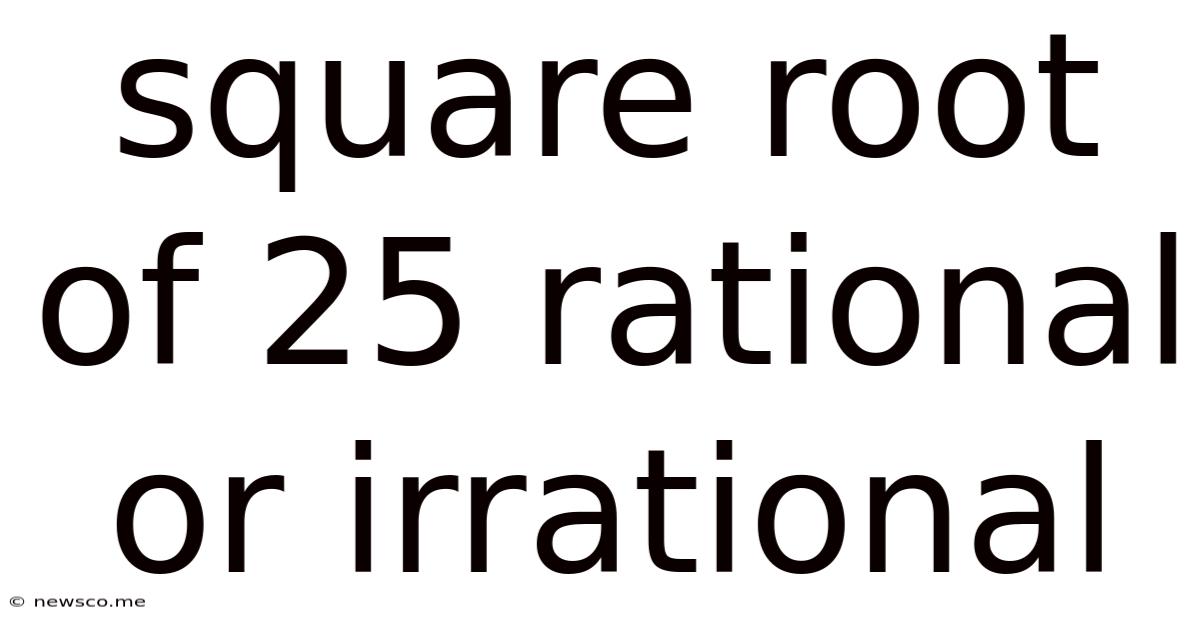Square Root Of 25 Rational Or Irrational
News Co
Apr 03, 2025 · 5 min read

Table of Contents
Is the Square Root of 25 Rational or Irrational? A Deep Dive into Number Theory
The question of whether the square root of 25 is rational or irrational might seem trivial at first glance. However, exploring this seemingly simple problem provides a fantastic opportunity to delve into the fundamental concepts of number theory, rational and irrational numbers, and the very nature of mathematical proof. This article will not only answer the question definitively but also provide a robust understanding of the underlying principles.
Understanding Rational and Irrational Numbers
Before we tackle the square root of 25, let's define our terms. Numbers are broadly classified into two main categories:
Rational Numbers: A rational number is any number that can be expressed as a fraction p/q, where 'p' and 'q' are integers, and 'q' is not equal to zero. Examples include 1/2, 3/4, -2/5, and even integers like 5 (which can be written as 5/1). When expressed as decimals, rational numbers either terminate (e.g., 0.75) or repeat in a predictable pattern (e.g., 0.333...).
Irrational Numbers: An irrational number cannot be expressed as a simple fraction of two integers. Their decimal representations are non-terminating and non-repeating. Famous examples include π (pi), approximately 3.14159..., and e (Euler's number), approximately 2.71828..., and the square root of 2 (√2).
Solving the Mystery: The Square Root of 25
Now, let's address the core question: Is √25 rational or irrational?
The square root of a number is a value that, when multiplied by itself, equals the original number. In this case, we are looking for a number that, when multiplied by itself, equals 25. That number is 5.
5 x 5 = 25
Since 5 can be expressed as the fraction 5/1 (where 5 and 1 are integers, and 1 ≠ 0), √25 is a rational number.
A Deeper Look: Proof by Contradiction
While the answer is straightforward, let's explore a more rigorous mathematical approach: proof by contradiction. This method assumes the opposite of what we want to prove and then demonstrates that this assumption leads to a contradiction, thereby proving the original statement.
Let's assume, for the sake of contradiction, that √25 is irrational.
If √25 is irrational, it cannot be expressed as a fraction p/q where p and q are integers and q ≠ 0. However, we know that:
√25 = 5
And 5 can be written as 5/1. This directly contradicts our initial assumption that √25 is irrational. Therefore, our assumption must be false, and the conclusion is that √25 is rational.
Extending the Concept: Other Square Roots
Understanding the rationality of √25 helps us analyze other square roots. Consider these examples:
- √4: This equals 2, which is rational (2/1).
- √9: This equals 3, which is rational (3/1).
- √16: This equals 4, which is rational (4/1).
- √2: This is approximately 1.414... It's an irrational number because its decimal representation is non-terminating and non-repeating. It cannot be expressed as a simple fraction.
The key difference lies in whether the number under the square root symbol is a perfect square (a number that results from squaring an integer). If it's a perfect square, the square root will be rational. If not, the square root will be irrational.
Perfect Squares and Their Significance
The concept of perfect squares is crucial in determining the rationality of square roots. A perfect square is the result of multiplying an integer by itself. Examples include 1, 4, 9, 16, 25, 36, and so on. The square root of any perfect square will always be an integer, and therefore, a rational number.
Understanding perfect squares allows us to quickly determine the rationality of the square root of many numbers. For instance:
- √81: Since 81 is a perfect square (9 x 9), √81 = 9, which is rational.
- √100: Since 100 is a perfect square (10 x 10), √100 = 10, which is rational.
- √12: 12 is not a perfect square, therefore √12 is irrational.
Practical Applications and Real-World Examples
While the concept might seem purely theoretical, understanding rational and irrational numbers has practical applications in various fields:
- Engineering and Construction: Precise calculations are essential, and understanding rational numbers ensures accuracy in measurements and designs.
- Computer Science: Representing numbers in computer systems often involves rational approximations of irrational numbers.
- Physics: Many physical constants, such as the speed of light and gravitational constant, involve irrational numbers.
Further Exploration: Beyond Square Roots
The principles discussed here extend beyond square roots. The rationality or irrationality of other mathematical expressions can be determined using similar methods. For instance, cube roots, higher-order roots, and even more complex mathematical functions can be analyzed to determine whether their results are rational or irrational. Understanding these concepts forms the bedrock of advanced mathematical analysis.
Conclusion: Rationality Reigns Supreme for √25
To summarize, the square root of 25 is definitively rational. It simplifies to 5, which can be expressed as the fraction 5/1, fulfilling the definition of a rational number. Exploring this seemingly simple problem allowed us to delve into the fascinating world of number theory, providing a solid foundation for understanding rational and irrational numbers and their significance in various mathematical and real-world applications. The concept of perfect squares plays a critical role in quickly determining the rationality of square roots. This exploration emphasizes the importance of rigorous mathematical proof and the beauty of seemingly simple mathematical concepts. The ability to confidently classify numbers as rational or irrational is an essential skill for anyone venturing into the world of mathematics and its applications.
Latest Posts
Related Post
Thank you for visiting our website which covers about Square Root Of 25 Rational Or Irrational . We hope the information provided has been useful to you. Feel free to contact us if you have any questions or need further assistance. See you next time and don't miss to bookmark.